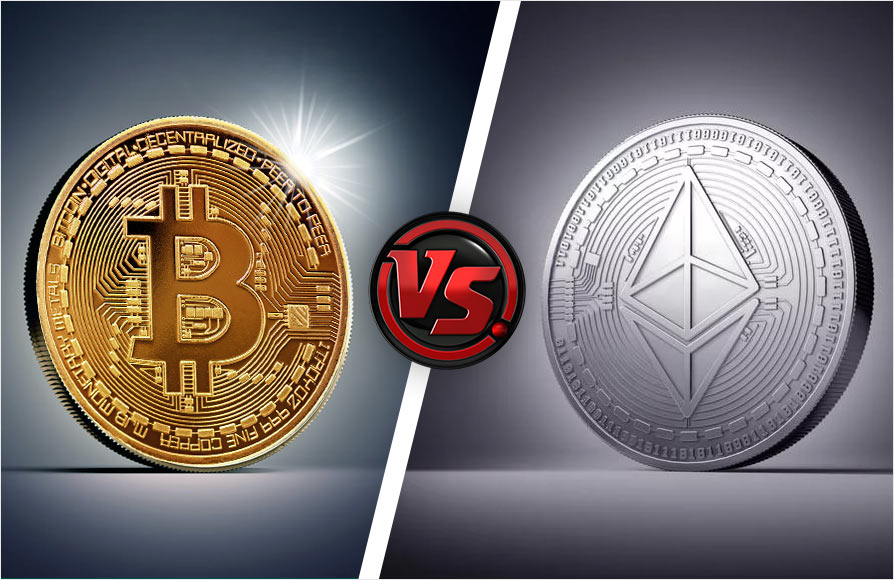The Ether (ETH) cryptocurrency, which is the second most popular digital currency after bitcoin (BTC), is a decentralized blockchain-based cryptocurrency that runs on the Ethereum network. It’s only natural to make comparisons between Ether and bitcoin, given their comparable market capitalization rankings of #2 and #3 respectively.
Ether and bitcoin are similar in many ways. Each is a virtual currency traded on online exchanges and stored in various types of cryptocurrency wallets, which means they’re both digital currencies. Both of these tokens are decentralized, which means they aren’t created or regulated by a central bank or other authority. Both utilize blockchain technology’s distributed ledger.
Although bitcoin and ether are both cryptocurrencies, there are several key differences between the two that investors should be aware of. Below, we will examine some of the most notable similarities and differences between these two digital assets.
In January 2009, bitcoin was introduced. Satoshi Nakamoto, the creator of bitcoin, presented a new concept in a white paper that promised an online currency free from any central authority control, unlike government-issued money.
There are no physical bitcoins, only amounts associated with a digital ledger that is secured by cryptography.
Bitcoin was not the first digital currency, however it quickly became known as a predecessor of all cryptocurrencies created in past years.
The idea of a virtual, decentralized currency has gained acceptance among regulators and government bodies over time. Despite the fact that it is not a formally recognized means of payment or store of value, cryptocurrency has found its place in the financial world and continues to co-exist with it despite being frequently analyzed and disputed.
Blockchain technology isn’t just used for digital currency. Ethereum, launched in 2015, is the leading decentralized software platform that uses blockchain technology.
Smart contracts and decentralized applications (dApps) can now be created and run without any downtime, fraud, control, or interference from a third party using Ethereum.
Ethereum includes its own programming language, which runs on a blockchain and allows developers to construct and run distributed applications.
The potential uses of Ethereum are numerous, and they are fueled by the cryptocurrency ether (abbreviated ETH). In 2014, Ethereum conducted a presale for ether, which resulted in an overwhelming response.
Ether is the cryptocurrency used to power the Ethereum blockchain. Developers use it to build and run decentralized applications on the Ethereum platform.
The most common type of cryptocurrency is Ethereum. It’s a decentralized platform for smart contracts, which means it’s sort of like an internet-based operating system where people can build apps and other digital services. Ethereum is used by many people all over the world to make payments, store value, or collateral. According to Ethereum, “people all around the globe utilize ETH to carry out transactions, save money, and as collateral.”
The Bitcoin and Ethereum networks both use distributed ledgers and cryptography, but they have many technical differences. For example, transactions on the Ethereum network can include executable code, while data attached to Bitcoin network transactions is usually just for keeping records. Other distinctions are block time (an ether transaction is confirmed in seconds rather than minutes for bitcoin) and the algorithms they run: SHA-256 for Bitcoin versus Ethash for Ethereum.
The PoW consensus mechanism that Bitcoin and Ethereum currently use allows the network’s nodes to reach agreement on the state of all information stored in their blockchains, as well as defensive measures against economic assaults.
In 3 years, Ethereum plans to move from its current system- proof of work (PoW)- to a more efficient one known as PoS. This is just one aspect of the Eth2 update which also includes increasing sustainability and scalability.
Proof of work is often criticised for being energy-hungry due to the amount of computational power required. Proof of stake, on the other hand, requires staking instead of computation which makes it less demanding in terms of energy. In addition, miners are replaced with validators who stake their cryptocurrency holdings to activate block creation.
The Bitcoin and Ethereum networks, on the other hand, are quite distinct in terms of their ultimate goals. While bitcoin was founded as an alternative to national currencies and aspires to be a medium of exchange and store of value, Ethereum was developed as a platform for developing immutable, programmatic contracts and applications utilizing its own currency.
Ether is a digital currency that aims to serve as a medium of exchange rather than as an alternative monetary system. Its primary aim is to allow the execution and financing of smart contracts on the Ethereum network, not to establish itself as a competing money system.
Another use case for a blockchain that is compatible with the Bitcoin network and should not directly compete with Bitcoin is Ethereum. However, because of the popularity of ether, it has become engaged in a fight for supremacy among all cryptocurrencies, particularly from the perspective of traders. Ether has generally been close behind bitcoin in terms of market cap rankings throughout most of its history since the mid-2015 launch.
The Ethereum ecosystem is flourishing at breakneck speed, thanks to the remarkable rise in popularity of its dApps in industries such as finance (decentralized finance, or DeFi apps), art and collectingibles (non-fungible tokens, or NFTs), gaming, and technology. This has helped ETH to surge 510% in 2021 (as of Nov. 29, 2021) compared with a 93 percent increase for BTC. As a consequence, while ETH’s market capitalization was around 10% of that of BTC’s in January 2020, it was roughly half as large at $528 billion by November 2021.






